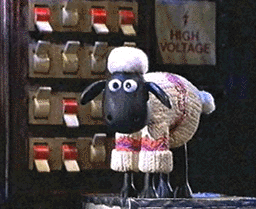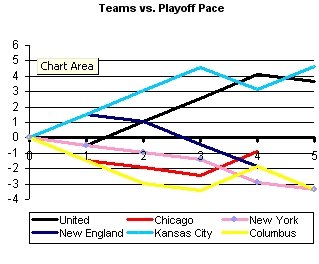Much has been made over the years of MLS Team names, and now that match 11.06 has come around, the DCenters was suddenly confronted with the name "The Colorado Rapids." Now, The DCenters could personally perform a reading of the text that is "The Colorado Rapids", but instead fortune shines on us, and we are joined by literary theorist Stanley Fish to explain some of the tensions inherent in the signifier "Colorado Rapids." Dr. Fish, welcome to The DCenters.
 It's a pleasure to be here. As you know, I'm a huge Bobby Boswell fan since I became the Davidson-Kahn Distinguished University Professor of Humanities and Law at Florida International University. Nice to see a local kid do well in MLS. Or, rather, it is good to see that many people share an interpretation that Mr. Boswell has done well and is in good form, since his performance on the field is only a text which is devoid of meaning until interpretation.
It's a pleasure to be here. As you know, I'm a huge Bobby Boswell fan since I became the Davidson-Kahn Distinguished University Professor of Humanities and Law at Florida International University. Nice to see a local kid do well in MLS. Or, rather, it is good to see that many people share an interpretation that Mr. Boswell has done well and is in good form, since his performance on the field is only a text which is devoid of meaning until interpretation.
Right. Couldn't agree more. Now, could you elaborate on the semiotic slippage that plagues the Colorado Rapids?
 Of course. As you know, an evaluation of any text, such as a team name, does not exist merely in the vacuum of authorial intent. Instead, we must evaluate the response to a text, to find an interpretive community, a space in which the meaning of the text fills. Clearly, the authors of the phrase "Colorado Rapids" wanted to evoke swiftness and danger, perhaps a denotative meaning evocative of Achilles. Yet when we apply theory to The Colorado Rapids, we must include the reader's natural response to the idea of "rapids". Namely, rapids are things to be ridden, exploited in nature, and ultimately conquered. Therefore the name "Colorado Rapids" is self-defeating, as it implies an eventual subjugation to the forces of man.
Of course. As you know, an evaluation of any text, such as a team name, does not exist merely in the vacuum of authorial intent. Instead, we must evaluate the response to a text, to find an interpretive community, a space in which the meaning of the text fills. Clearly, the authors of the phrase "Colorado Rapids" wanted to evoke swiftness and danger, perhaps a denotative meaning evocative of Achilles. Yet when we apply theory to The Colorado Rapids, we must include the reader's natural response to the idea of "rapids". Namely, rapids are things to be ridden, exploited in nature, and ultimately conquered. Therefore the name "Colorado Rapids" is self-defeating, as it implies an eventual subjugation to the forces of man.
Fascinating. So what you are saying is that the Colorado Rapids, by their name, will have their agency subsumed by other forces which will always master them?
 It the Second Great Law of Team Names: Don't pick a name that people will naturally ride in or on top of for fun or pleasure. The first Great Law is, of course, not to pick a name that will offend a minority market in your country. That is why the Dallas Cowboys resonate with semioticians much more than the Denver Broncos, as the Cowboy will naturally be imaged subduing the Bronco. Similarly, other team names imply a lesser power dynamic inviting images of being mastered by others include the New York Jets (will be ridden by others), Buffalo Bills (prey to be hunted), New York Red Bulls (slaughtered by matadors or cans crushed underfoot at tailgates), the Anaheim Mighty Ducks (doomed to be pelted with small bits of bread), and the Southern California Jennifer Garners.
It the Second Great Law of Team Names: Don't pick a name that people will naturally ride in or on top of for fun or pleasure. The first Great Law is, of course, not to pick a name that will offend a minority market in your country. That is why the Dallas Cowboys resonate with semioticians much more than the Denver Broncos, as the Cowboy will naturally be imaged subduing the Bronco. Similarly, other team names imply a lesser power dynamic inviting images of being mastered by others include the New York Jets (will be ridden by others), Buffalo Bills (prey to be hunted), New York Red Bulls (slaughtered by matadors or cans crushed underfoot at tailgates), the Anaheim Mighty Ducks (doomed to be pelted with small bits of bread), and the Southern California Jennifer Garners.
I must confess, I had no idea that literary theory could be applied to sporting events so readily.
 You often hear of athletes visualizing their performance on a field before playing a match. What is visualization if not an act of interpretation? And influencing that interpretation is the choice of totem image, the primary signifier through a mascot that is a team name. The Rapids are doomed to visualize themselves being mastered.
You often hear of athletes visualizing their performance on a field before playing a match. What is visualization if not an act of interpretation? And influencing that interpretation is the choice of totem image, the primary signifier through a mascot that is a team name. The Rapids are doomed to visualize themselves being mastered.
Thank you for your comments Dr. Fish. Any final predications?
 Colorado nil, DC United 2, on goals from Eskandarian and Moreno. Boswell gets an assist.
Colorado nil, DC United 2, on goals from Eskandarian and Moreno. Boswell gets an assist.

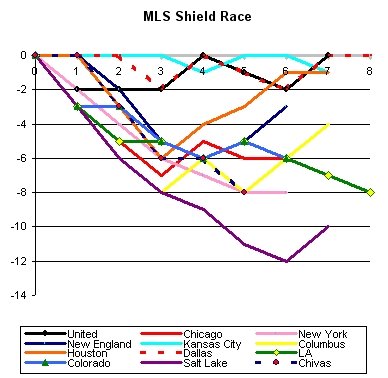
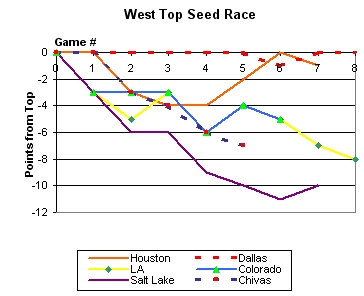
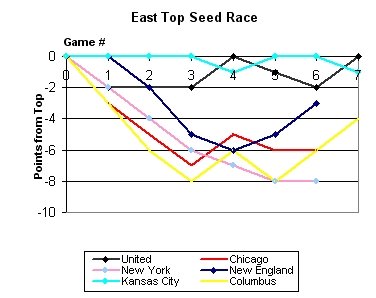
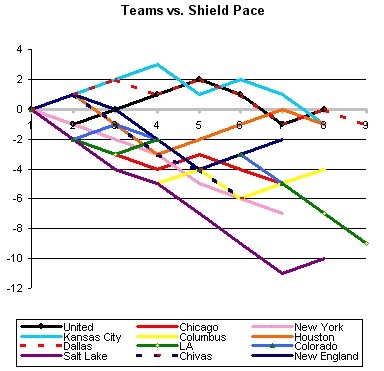
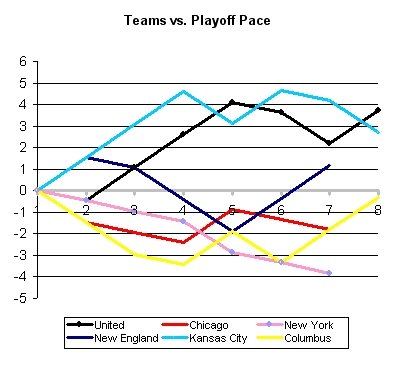
 It's a pleasure to be here. As you know, I'm a huge Bobby Boswell fan since I became the Davidson-Kahn Distinguished University Professor of Humanities and Law at Florida International University. Nice to see a local kid do well in MLS. Or, rather, it is good to see that many people share an interpretation that Mr. Boswell has done well and is in good form, since his performance on the field is only a text which is devoid of meaning until interpretation.
It's a pleasure to be here. As you know, I'm a huge Bobby Boswell fan since I became the Davidson-Kahn Distinguished University Professor of Humanities and Law at Florida International University. Nice to see a local kid do well in MLS. Or, rather, it is good to see that many people share an interpretation that Mr. Boswell has done well and is in good form, since his performance on the field is only a text which is devoid of meaning until interpretation.